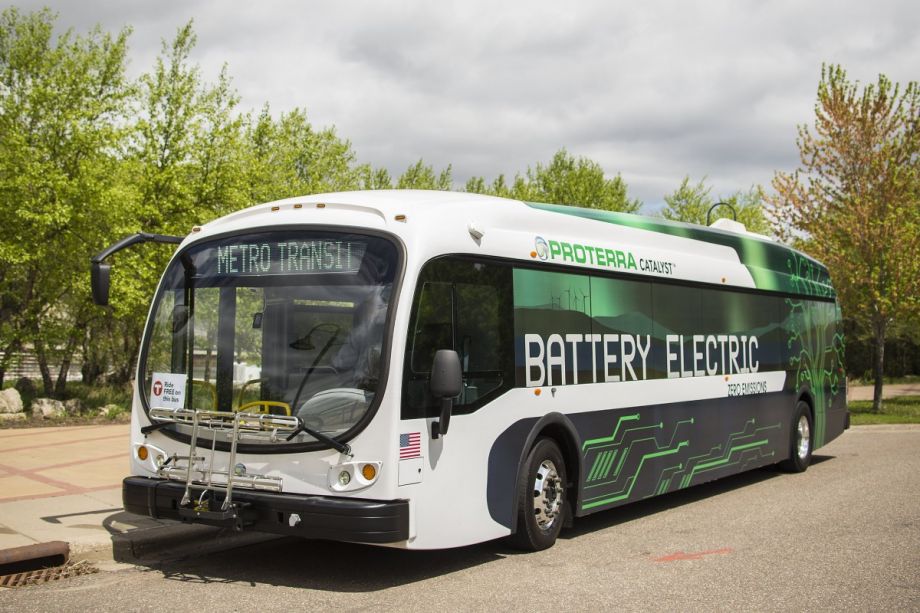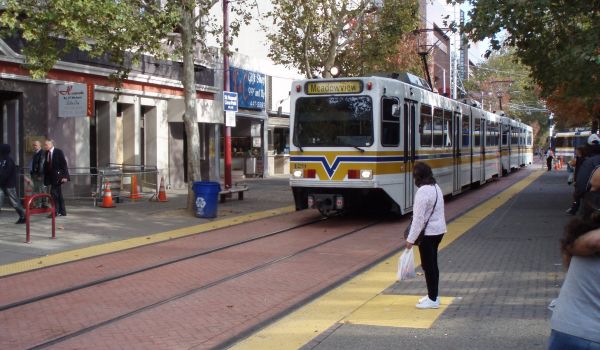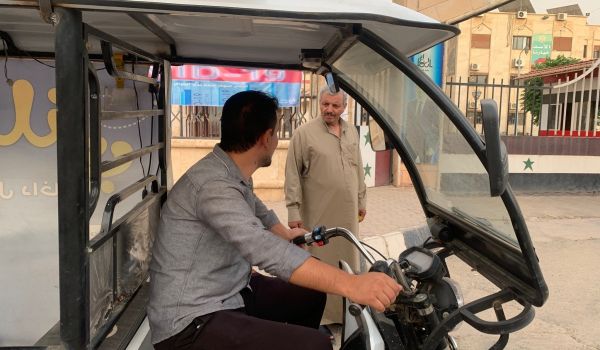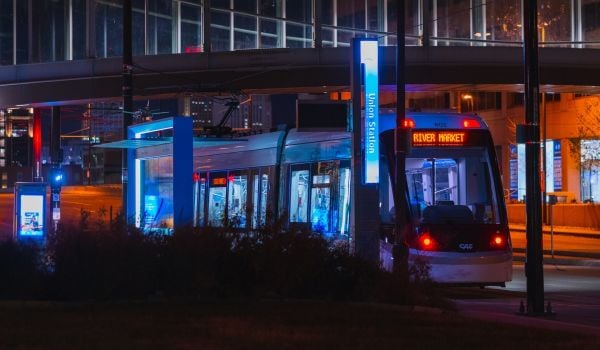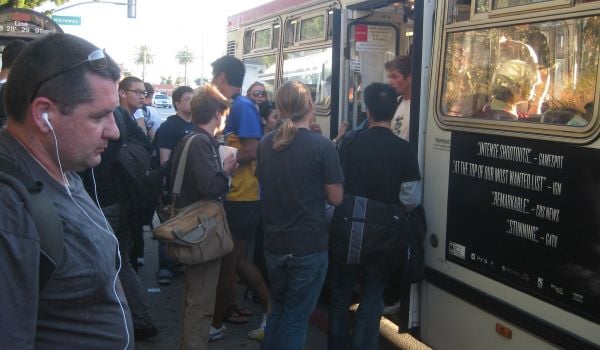Welcome to “The Mobile City,” our weekly roundup of new and newsworthy transportation developments.
In case you missed it, Elon Musk had another flop before his appearance on “Saturday Night Live” May 8: One month before his “SNL” star turn, he invited the press to the Las Vegas Convention Center for a progress report on his loop subway, which he sold as a time-saver for patrons at the huge facility. And the press pronounced it a disappointment: Instead of a futuristic automatic transit system that would whisk large crowds from one end of the vast complex to the other, what Musk delivered was some human-driven Tesla Model 3s rolling through a small tunnel at a mere 30 mph.
Thus another nail has been driven in the coffin of the tech bros’ predictions that cars — autonomous, electric, or otherwise — will be able to solve all our transportation problems. Noting several other high-profile setbacks on the self-driving-car front, yet another opinion piece this past week argued that what we should be doing instead is throwing money at the buses. And in a sort of cross-pollination of that argument and the tech community’s push to electrify everything, two members of Congress have proposed that Uncle Sam spend $75 billion to make every bus in the country an electric one.
A more promising frontier for transportation innovation is in the field known as “transit on demand.” The marriage of networked vehicle and demand management with smartphone apps and minibuses bids fair to make mass transit more useful and effective for more people. And this past week, one big-city transit agency — Philadelphia’s — actually took transit on demand into another community conventional transit serves poorly, namely, the community of overnight workers scattered across the suburban landscape..
Meanwhile, on the transportation-equity front, several states and cities have moved to take one very small step towards more racially equitable transportation policy, namely, decriminalizing jaywalking. This past week, the city of Kansas City, Mo., became the latest jurisdiction to get rid of its laws punishing jaywalkers. Advocates for this change in the laws offer several reasons why this is a good idea.
Senators Propose a $73 Billion Stimulus Package for Electric Buses
Streetsblog USA reports that Senate Majority Leader Chuck Schumer (D-N.Y.) and Senator Sherrod Brown (D-Ohio) are adding a “green new deal” of their own to President Biden’s proposed transportation spending plan.
Their proposed “Clean Transit for America Plan” would pour $73 billion into a program to convert every transit bus in the nation to electric power. Added to the $25 billion Biden’s American Jobs Plan would spend on transit vehicle electrification, the article notes that the total commitment to electric transit would just about match the amount the President plans to spend on rebates aimed at getting electric cars in more American garages.
The money would help transit agencies clear the highest hurdle in the path to full transit electrification: the high upfront costs. A typical electric bus costs more than $850,000, more than double the price of a diesel bus, and electric buses’ much lower fuel and maintenance costs still aren’t low enough over time to justify the expense for most cash-strapped transit agencies.
While the article notes that the Clean Transit plan would do more to help the country meet its targets for limiting global warming, it goes on to say that the details of the plan still need to be worked out. Will the money go mainly for the purchase of new vehicles and charging infrastructure, or will it go instead towards research and development aimed at bringing down the purchase price and extending the range of electric buses? Regardless where the program puts its emphasis, its supporters say it will be revolutionary all the same: “This forward-thinking investment will spur innovation, clean the air in our communities, and help us address the dramatic impacts of climate change across the nation,” American Public Transportation Association President and CEO Paul Skoutelas told Streetsblog. “[It’s] game-changing.”
But first, it must pass Congress.
On-Demand Transit Works the Night Shift in the Philadelphia Suburbs
As both riders and transit providers are learning, transit-on-demand is proving its worth as a means of filling the holes left by conventional fixed-route transit. Smaller cities and suburbs have launched such systems to serve areas transit buses serve poorly, if at all.
Now transit-on-demand is venturing into new territory: the overnight hours.
Mass Transit reports that the Southeastern Pennsylvania Transportation Authority has launched a partnership with on-demand transit operator Via that will allow night-shift workers to reach job sites in lower Bucks County, outside Philadelphia, between 10:30 p.m. and 6 a.m.
The service, called Owl Link, carried its first riders Monday, May 10. The free-to-use service connects stops on three SEPTA bus routes that operate through Northeast Philadelphia with a growing number of Lower Bucks employers that operate round the clock.
Riders wishing to use Owl Link can either download a smartphone app or call SEPTA’s paratransit service phone number to schedule a trip. Riders will need to use SEPTA Key fare cards to validate themselves but will not be charged for the trips. Passengers can book trips as far as one week ahead and as close as 30 minutes before travel time.
With this service, SEPTA and Via hope to both close the last-mile gap and increase access to jobs for Philadelphia residents.
“This on-demand service will help ensure that third-shift workers have safe, reliable and affordable options as they plan for job-related travel,” SEPTA General Manager Leslie S. Richards said in a news release. “This pilot program also gives SEPTA an opportunity to evaluate this type of first-and-last mile service for other locations.”
Kansas City Becomes Latest Jurisdiction to Decriminalize Jaywalking
In the 1920s, as the automobile spread across the land, carmakers and their allies urged states and cities to pass laws that made streets and roads heretofore open to all the exclusive province of motor vehicles by outlawing crossing them except in marked crosswalks. Prior to this time, “jaywalking” simply didn’t exist.
Now, as part of the broader movement for racial justice, it looks like the crime of jaywalking is headed for the dustbin of history. According to an article in Streetsblog USA offering advice on when, and why, to get rid of anti-jaywalking laws, the state of Virginia lifted its prohibition of jaywalking on March 1, and both Texas and California are considering legislation that would decriminalize the act of walking in a road or street.
The article also mentioned that “a similar effort is underway in Kansas City, and advocates are hopeful that even more reform will be on the horizon.”
The day after this article appeared, The Kansas City Star reported that the effort had paid off: The city council there voted 10-0 to strike jaywalking from the city’s criminal code. The legislation also got rid of penalties for operating lightweight passenger vehicles, including bikes and scooters, with dirty tires, and it also removed a clause that allowed police to inspect bicycles where they had “reasonable cause” to believe they were unsafe.
In the runup to the bill’s passage, Jane Brown, Mayor Quinton Lucas’ general legal counsel, gave the demographic reasons for the change. Noting that the city had issued 123 jaywalking citations in the preceding three years, she stated that 65 percent of them had been issued to Black people and 83 percent to men. (Black people make up about 30 percent of Kansas City residents.)
Advocacy organizations in several fields, from tenant rights to mass transit to children’s health to the environment, gave testimony in favor of the bill. Andrea Clark, policy and planning manager at KC Healthy Kids, wrote, “It is unreasonable to punish people for walking in the street when many neighborhoods lack safe and accessible sidewalks, especially in under-resourced and Black and Brown communities. Instead, we should invest in the built environment to create streets and public spaces that are safe and accessible for users of all ages, abilities, and modes of transportation.”
In addition to contributing to over-policing of and police brutality towards Black people, the Streetsblog article notes, the jaywalking laws also blamed the victims for their own deaths and injuries. And they failed to actually make streets safer for pedestrians: the article notes that over the course of the last decade, pedestrian deaths steadily rose despite their presence, hitting an all-time high per vehicle miles traveled last year.
Know of a development that should be featured in this column? Send a Tweet with links to @MarketStEl using the hashtag #mobilecity.

Next City contributor Sandy Smith is the home and real estate editor at Philadelphia magazine. Over the years, his work has appeared in Hidden City Philadelphia, the Philadelphia Inquirer and other local and regional publications. His interest in cities stretches back to his youth in Kansas City, and his career in journalism and media relations extends back that far as well.
Follow Sandy .(JavaScript must be enabled to view this email address)

